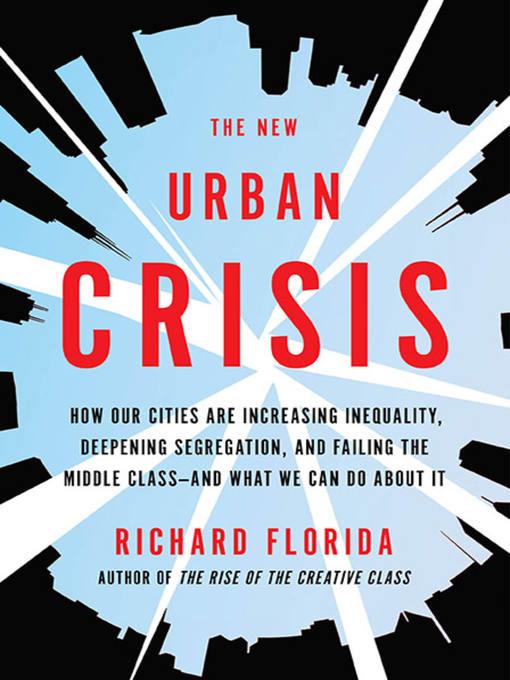
The New Urban Crisis
How Our Cities Are Increasing Inequality, Deepening Segregation, and Failing the Middle Class--and What We Can Do About It
کتاب های مرتبط
- اطلاعات
- نقد و بررسی
- دیدگاه کاربران
نقد و بررسی

March 27, 2017
Urban studies expert Florida (The Great Reset), who first gained acclaim studying the ascendancy of the “creative class,” now explores the broader effects of its rise in this timely, data-rich, and accessible work. Florida notes that while people fare better economically in large, dense cities, those cities are also experiencing rising inequality, housing costs, and economic and racial segregation. Moreover, these problems are spreading to the suburbs, the onetime model for improved living standards. These divisions are particularly strong in “superstar cities” such as New York, San Francisco, and London, where concentrated wealth makes the urban core inaccessible to all but the most privileged people. A series of maps show how service workers’ neighborhoods have been steadily pushed to the periphery. This worrisome dynamic isn’t confined to North America and Western Europe, as Florida’s research shows. He recommends changing tax schemes to reflect the value of urban land, rather than the property developed on top of it; intensifying support for mass transit; increasing affordable rental housing in urban core areas; and focusing on schools and better wage conditions in the poorest neighborhoods. These prescriptions are all sound but—in the current political climate—particularly difficult to achieve. Agent: Jim Levine, Levine Greenberg Rostan Literary Agency.

February 15, 2017
A prominent urban theorist examines the hidden impacts of gentrification and innovation on (mostly) American cities.Prolific sociologist Florida (Director, Martin Prosperity Institute/Univ. of Toronto; The Great Reset: How New Ways of Living and Working Drive Post-Crash Prosperity, 2010, etc.) builds on his earlier work about the "creative" economy to argue that his optimism about cities' recoveries from the era of white flight and neglect must now be tempered with recognition of "a dark side to the urban resurgence and back-to-the-city movement." He wryly acknowledges backlash against his own ideas and the gentrifying takeovers of blue-collar areas: "What troubled me most of all was the decline and disappearance of the great middle-class neighborhoods." Florida organizes his discussion in thematic chapters, trying to nonjudgmentally demonstrate how well-intentioned elites have managed to repair once-blighted cityscapes while still harming their cultural vernacular, adding further stressors to the lives of the working poor and minority groups in now-coveted neighborhoods. In "The Inequality of Cities," he explores how an economic recovery fueled by tech and media "creatives" inevitably worsens inequality, noting, "our most liberal cities also number among the most unequal." In "The Bigger Sort" and "The Patchwork Metropolis," the author presents data to suggest that racial and class segregation are actually hardening, particularly in glamorous tech cities (San Francisco) and so-called global cities (New York), due to housing prices. Florida also explores the disturbing irony that classic urban pathologies of violence, drugs, and malaise have migrated to cities' suburban belts: "Large swaths of them are places of economic decline and distress." Florida draws subtle, thoughtful inferences from his research, and he writes in slick, approachable prose overly studded with phrases that aspire to be intellectual buzzwords (the title is repeated frequently). Throughout, the author remains an idealistic, perceptive observer of cities' transformations. A sobering account of inequality and spatial conflict rising against a cultural backdrop of urban change.
COPYRIGHT(2017) Kirkus Reviews, ALL RIGHTS RESERVED.

March 15, 2017
There is a new urban crisis impacting cities and suburbs, maintains Florida (director, Martin Prosperity Inst., Univ. of Toronto; The Rise of the Creative Class). The author considers such issues as increasing inequality, rising housing prices, economic and racial segregation, spatial inequality, and entrenched poverty. He concludes that a "winner-take-all urbanism" is creating a growing gulf between "superstar cities" that have high concentrations of talented people and economic resources, and areas that do not. This "clustering force" is seen as creating "areas of concentrated affluence and concentrated poverty," and leading to the shrinking of middle-class neighborhoods. Florida offers several solutions, along with supporting documentation, that will ensure growth and prosperity for a larger segment of the population. Some of these ideas include building more affordable rental housing in central locations, switching from a property tax to a land value tax, and having the minimum wage reflect the local cost of living. Social theorists may find fault with the conclusions and proposed remedies, but urban planners should consider the case being made for the need to address a new urban crisis. VERDICT A thought-provoking work for those interested in all stages of urban planning and placemaking.--Karen Venturella Malnati, Union Cty. Coll. Libs, Cranford, NJ
Copyright 2017 Library Journal, LLC Used with permission.

























دیدگاه کاربران